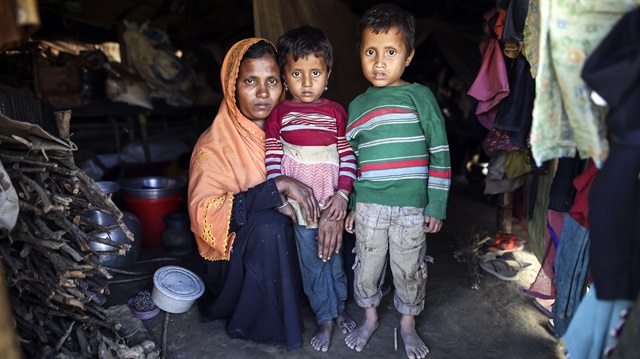
The list makers became more organised as weeks of labour rolled into months. They took over three huts and held meetings, bringing in a table, plastic chairs, a laptop and a large banner carrying the group's name.
The MSF survey was carried out to determine how many people might need medical care, so the number of people killed and injured mattered, and the identity of those killed was not the focus. It is nothing like the mini-genealogy with many individual details that was produced by the Rohingya.
Mohib Bullah and some of his friends say they drew up the lists as evidence of crimes against humanity they hope will eventually be used by the International Criminal Court, but others simply hope that the endeavour will return them to the homes they lost in Myanmar.
"If I stay here a long time my children will wear jeans. I want them to wear longyi. I do not want to lose my traditions. I do not want to lose my culture," said Mohammed Zubair, one of the list makers. "We made the documents to give to the U.N. We want justice so we can go back to Myanmar."
Matt Wells, a senior crisis advisor for Amnesty International, said he has seen refugees in some conflict-ridden African countries make similar lists of the dead and arrested but the Rohingya undertaking was more systematic. "I think that's explained by the fact that basically the entire displaced population is in one confined location," he said.
Wells said he believes the lists will have value for investigators into possible crimes against humanity.
"In villages where we've documented military attacks in detail, the lists we've seen line up with witness testimonies and other information," he said.
Spokespeople at the ICC's registry and prosecutors' offices, which are closed for summer recess, did not immediately provide comment in response to phone calls and emails from Reuters.
The U.S. State Department also documented alleged atrocities against Rohingya in an investigation that could be used to prosecute Myanmar's military for crimes against humanity, U.S. officials have told Reuters. For that and the MSF survey only a small number of the refugees were interviewed, according to a person who worked on the State Department survey and based on published MSF methodology.
MSF did not respond to requests for comment on the Rohingya lists. The U.S. State Department declined to share details of its survey and said it wouldn't speculate on how findings from any organization might be used.
For Mohammed Suleman, a shopkeeper from Tula Toli, the Rohingya lists are a legacy for his five-year-old daughter. He collapsed, sobbing, as he described how she cries every day for her mother, who was killed along with four other daughters.
"One day she will grow up. She may be educated and want to know what happened and when. At that time I may also have died," he said. "If it is written in a document, and kept safely, she will know what happened to her family."

















